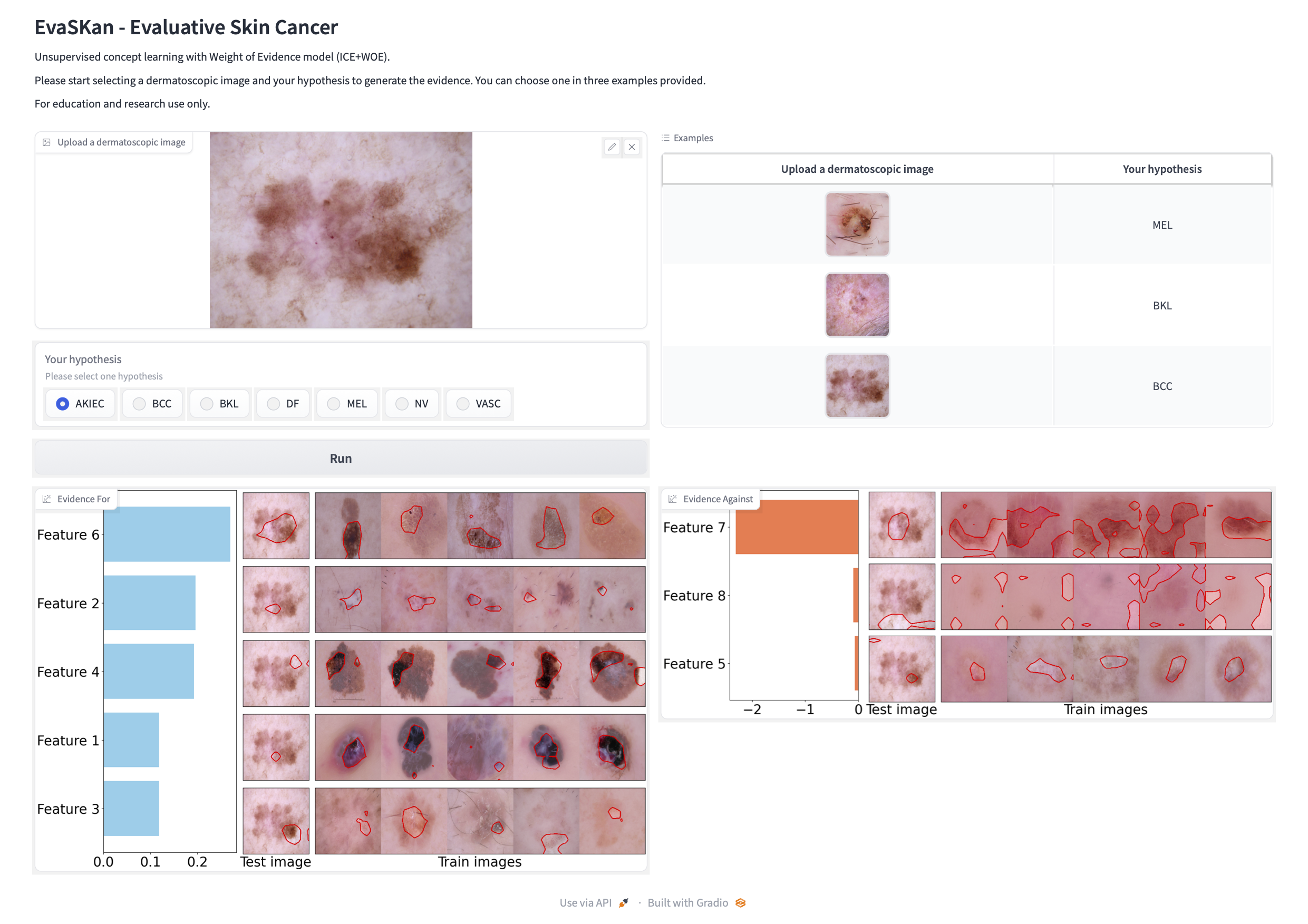Visual Evaluative AI is a tool for decision support by providing positive and negative evidence for a given hypothesis. This tool finds high-level human concepts in an image and generates the Weight of Evidence (WoE) for each hypothesis in the decision-making process. We also apply this tool in the skin cancer domain by building a web-based application that allows users to upload a dermatoscopic image, select a hypothesis and analyse their decisions by evaluating the provided evidence.
By applying this tool, we build a web-based application called EvaSKan to evaluate dermatoscopic images. Users can select a hypothesis and the application will generate positive/negative evidence for that particular hypothesis.
Python 3.10.4
CUDA 12.2.0
UCX-CUDA 1.13.1-CUDA-12.2.0
cuDNN 8.9.3.28-CUDA-12.2.0
Graphviz 5.0.0
torch 2.1.2+cu121
torchvision 0.16.2+cu121
virtualenv ~/venvs/venv-3.10.4-cuda12.2 #create the env
source ~/venvs/venv-3.10.4-cuda12.2/bin/activate #activate the env
pip3 install torch torchvision torchaudio
pip3 install -r requirements.txt
datasets
├── 7-point-criteria
└── HAM10000
save_model
EvaluativeAI
├── Explainers
├── README.md
├── app.py
├── classifiers.py
├── config.py
├── eval.py
├── ice
│ ├── __init__.py
│ ├── channel_reducer.py
│ ├── explainer.py
│ ├── model_wrapper.py
│ └── utils.py
├── ice_clfs.py
├── learn_concepts_dataset.py
├── main.py
├── pcbm
│ ├── concepts
│ │ ├── __init__.py
│ │ └── concept_utils.py
│ ├── data
│ │ ├── __init__.py
│ │ ├── concept_loaders.py
│ │ ├── constants.py
│ │ └── derma_data.py
│ └── models
│ ├── __init__.py
│ ├── derma_models.py
│ ├── model_zoo.py
│ └── pcbm_utils.py
├── pcbm_output
├── preprocessing
│ ├── cnn_backbones.py
│ ├── data_utils.py
│ ├── initdata.py
│ └── params.py
├── reproducibility
│ ├── output
│ └── script
│ ├── pretrained.sh
│ └── scratch.sh
├── requirements.txt
├── test_data
├── train_cnn.py
├── utils.py
└── woe
├── __init__.py
├── explainers.py
├── utils.py
├── woe.py
└── woe_utils.py
- HAM10000 dataset: Skin lesion classification dataset - Kaggle Link
- Derm7pt: Dermatology concepts dataset - Link
Please put the datasets in the right folder followed the code structure above.
To reproduce the results in the paper Visual Evaluative AI: A Hypothesis-Driven Tool with Concept-Based Explanations and Weight of Evidence, please either use pre-trained models or train from scratch as described below. Then, run python eval.py to see the results.
- Available pre-trained models Download
- Pre-trained CNN backbones Resnet50, ResneXt50 and Resnet152: in the folder
save_model - Pre-trained concept models ICE, PCBM: pickle files in the folder
Explainers - Pre-trained concept bank for PCBM: in the folder
pcbm_output
- Pre-trained CNN backbones Resnet50, ResneXt50 and Resnet152: in the folder
- Please refer to
reproducibility/script/pretrained.shfor the training using pre-trained models above
- Step by step to train from scratch
- Train the CNN backbone model
- For unsupervised learning concept, train the concept model ICE
- For supervised learning concept, we first need to train the concept bank using the 7pt checklist dataset, then train the concept model PCBM using the HAM10000 dataset
- Please refer to
reproducibility/script/scratch.shfor training from scratch
Before running the app, please download the for_app.zip Download and follow the code structure to put them in the right place.
# Use an unsupervised learning concept model (ICE)
python app.py --algo ice
# Use a supervised learning concept model (PCBM)
python app.py --algo pcbm
@misc{le2024visualevaluativeaihypothesisdriven,
title={Visual Evaluative AI: A Hypothesis-Driven Tool with Concept-Based Explanations and Weight of Evidence},
author={Thao Le, Tim Miller, Ruihan Zhang, Liz Sonenberg, Ronal Singh},
year={2024},
eprint={2407.04710},
archivePrefix={arXiv},
primaryClass={cs.CV},
url={https://arxiv.org/abs/2407.04710},
}